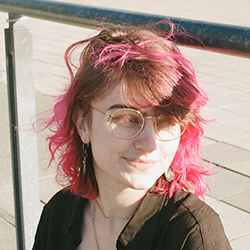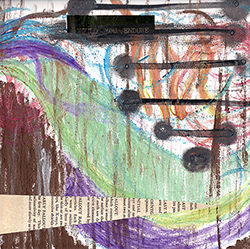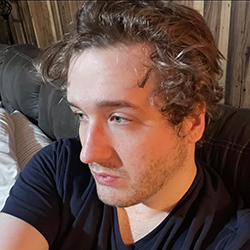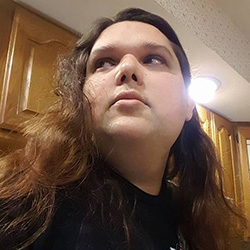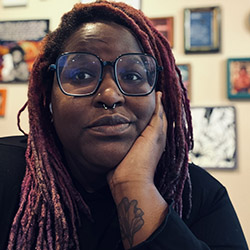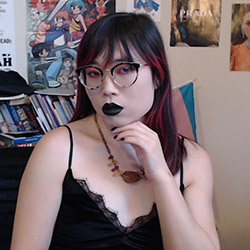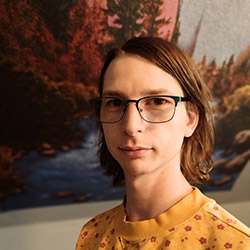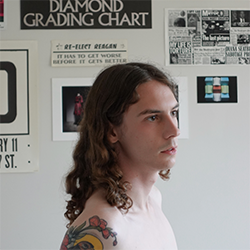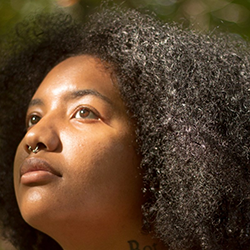Love
Emma stepped off her porch. She was surprised to feel the cool grass beneath her feet, perhaps because she had expected to be wearing shoes, or at least slippers. She didn’t really know how any of this worked. Wasn’t she the one who should be visited, not the other way around? Emma couldn’t complain about her bare feet too much, however, as the grass felt nice, and with each step she took, she focused on the grass more and more. It was soft, cool, slightly damp with midnight dew and altogether lovely. After seventy-eight years of wearing some type of footwear, the feeling of this grass sent a shock of emotion over her as a much younger, spryer little Emma ran out the front door of her mind. The two embraced, and Emma, still a bit dumbstruck, couldn’t help but squeeze the little one back.
“You didn’t wait for me. You’re supposed to wait,” little Emma muffled into older Emma’s belly. She looked up with a sigh. “Then again, nobody is really given a rule book or anything, so I forgive you.”
“Are you really me?” Emma said, still clutching at her younger self. She stroked little Emma’s hair, tied up in the back in a simple ponytail.
Little Emma pulled away gingerly. She scrunched up her face the way children are wont to do when confronted with a silly question. “I am. Same as you are me.”
“But how?” Emma began to ask, before she was cut off by little Emma grasping her hand and pulling her onward. Best not to ask any more silly questions.
“Come on, then,” little Emma tugged at the much older, much harder hand. “We technically don’t need to rush, but I can’t stand just standing here. Oh wait.”
Emma was pulled back into another hug, deeper, and quieter this time. She stood as statues, each breathing the other in. Emma, who had hugged many, many people in her life as it was a favorite of hers, never felt this kind of feeling before. A whole-hearted affection, an adoration and deep respect infused them both. Whereas she had felt similar emotions towards loved ones in her life, she never had felt herself all at once, and she basked in it.
“All right then, let’s go,” said little Emma, taking a step back.
Emma wiped a tear from her eye. “That felt wonderful.”
Little Emma had already half-danced half-walked her way to the end of the driveway and onto the sidewalk. Emma followed after, deciding to keep a walking pace. She had a strange intuition of the direction she needed to go, and an image appeared in her mind. A gazebo?
“Hey, um, Emma?” Emma called after her younger self. “Are you taking me to a gazebo by chance?”
“Mm-hmm.”
She continued down the sidewalk, little Emma always two steps ahead.
“Is there something there for me?”
Little Emma tilted her head upward, thinking. “No,” she finally said. “Why would there be?”
“Oh, well, I guess… well I just thought there might have been a reason for us to visit the gazebo, that’s all.”
“No, no reason really. I just like that gazebo quite a lot. I thought you’d like to join me is all.”
Emma thought for a moment. The image of the gazebo became clearer. Plainly sculpted hedges surrounded it, cream-white painted wood gave way to a dark brown shingled roof, moss and lichen grown over a third of its surface. Inside, the wooden floor, once painted crimson, is now faded to a pale pink. A footpath through the paint ended in a central faded circle. Two cream white benches sat on opposite ends of the gazebo, one facing the passing river, the other facing the entrance. Emma knew it well.
“Remember we used to go to the gazebo all the time? To do our homework, to read a book.” Little Emma’s voice trailed off.
“To get away from Mom and Dad,” Emma finished.
“Yeah, that too.” Little Emma turned and began to walk backwards, her arms pumping back and forth in mock exertion. “Remember the time we climbed up on the roof?”
Older Emma replied, “There was a sign just outside the gazebo that said, ‘no fishing inside the gazebo’, so we got up there and cast our line. I think we caught a fish that day, maybe a sunfish though, I remember being a bit disappointed at that.”
“Yeah, but how disappointed can we be when we’re fishing from the roof of a gazebo?”
Emma chortled, “that’s true. We must have been your age when we did that.”
Brush strokes of moonlight shone through breaks in the clouds. As she walked, Emma looked about her, taking in the familiar town. Dark trees lined the road as she made her way towards the center of town. Neighboring houses, nestled far back from the road, silhouetted as woodland sentinels, exuded a leering authority.
The first streetlamp on the main road loomed ahead, illuminating a lone bench situated on a bend in the road. Someone was sitting there, the only distinguishing feature being an amber glow near their face. The familiar bench came into focus, and Emma realized the individual sitting there was her mother.
“Emma, hold up. Is that our mother?”
Little Emma replied, “it is.”
“I think I need to speak with her. Do you mind waiting for me?”
She shrugged. “Okay.”
The woman on the bench looked to be in their mid-forties, golden-red hair highlighted with streaks of gray.
“You weren’t supposed to find me here,” said Emma’s mother. “I’m not putting it out.”
Smoke trailed up from a trash can a few feet from the bench. The smell was sickening and brought forth a wave of memories Emma had no use for. The memories swirled and coalesced into a singular image, that of her mother sitting in her reclining chair, legs tucked up under her and a blanket coving her from the waist down. A cigarette dangling from her fingers, the smoke rising to a pronounced yellow stain on the ceiling. The only source of light was the dim grey-blue glow of the television, some game show or other flashing bright primary colors and promises of riches into her mother brain.
“You don’t need to put it out,” Emma said. “Can I sit?”
Her mother scooched over, allowing a place for Emma to sit. Neither said anything for a long while.
Emma’s mother flicked the tip of her cigarette against her knee. “What are you doing out?”
Emma said, “I don’t know, just thought I’d go for a walk. You?”
“Wanted to smell the outdoors,” she sighed.
“I don’t know how you can smell anything over that.” Emma said.
“Is this what we’re doing now? We just gonna be sarcastic and short?” She took a drag and blew it out the side of her mouth. “Come on, you’re, what, seventy, seventy-five? You should be better at this than me by now.”
“I know. You’re right.”
Emma’s mother scoffed, “I’m what? Oh my, I can die happy now, someone told me I’m right.”
Emma closed her eyes flinchingly. “I’m sorry, mom”
“Oh, now you’re sorry? Sorry for what? For telling me I’m right?”
Emma remained silent.
Emma’s mother looked to the road, took another drag from her cigarette, “I’m not putting it out.”
Emma opened her eyes. “You don’t have to.”
“Well there’s something new.”
“I’m sorry.” Those two words held all the meaning they needed, and they both felt their impact. After all the hardship her mother endured from her own father; kicked out multiple times for the smallest offence, each time wandering the streets of Manchester, in search of a payphone for her aunt to pick her up. The last time ended with two men finding her, dragging her into an ally. Then she married dad, had two kids, and gave up on her dream of becoming a hairdresser, for the kids she never wanted. All those hollow nights waiting for Dad to come home from work. Home from the bar. Home from his self-medication. Just home. She craved an intimate connection with the person she fell in love with, but never was able to see the chained up box that was his emotions. Both of Emma’s parents did the best they could with what they were taught. But what they were taught was caustic. All parents like this can only bleed on their children. The criticisms and condescension, mockery and conceit, constraint and belittling. These were her mother’s to endure from her father. Always never enough. Always silenced. Always numb. Emma stood and opened her arms wide. “Come on, Mom.”
Her mother tapped her cigarette and peered up at her daughter, maybe thirty years her senior. She stood and embraced her.
“I love you, Mom.”
“I love you too, sweet.”
Emma pulled away, and the face she beheld was no longer that of her mother. The face was now her own. But not the child; an older Emma, that of when she was a teenager.
“She’s slowly killing herself and you just make nice with that?” Younger Emma tore away from her older counterpart and backed onto the street. “She can’t put those fucking things down, Emma! Her fingers are turning yellow, she hacks up a lung every morning, the house reeks of smoke, and she never moves from that chair!
“That’s not her fault.”
“How do you figure that one?” Emma crossed her arms over her chest. “How is this not her fault?”
“She did only what she knew. Those gave her a comfort she couldn’t get elsewhere.”
“Maybe if she focused more on her family instead of those cigarettes, she’d have found that comfort.”
The telephone wires above the road reflected an oncoming light.
“What family, Emma? Our father was gone most of the time, and when he was home, he was drinking, playing some game, or sleeping. He denied her that comfort. He hated her smoking as well, shamed her for it every chance he got, because that’s what he thought teaching was, because that’s how he was taught. She cried every night on the couch because of him. And we took his side.”
The traffic lines on the road began to brighten.
“We knew how bad cigarettes were, we knew how deadly they were, so we saw what he said to her as coming from a place of love. We were so caught up in the idea of losing her to lung cancer that we ignored the cancer in her marriage.” Emma reached a hand out to her younger self, “Now please, get out of the road.”
Younger Emma remained still. “Dad was too busy working his ass off, keeping a roof over our heads, too tired all the time to do much else about it. All Mom had to do was make dinner. She barely even had to clean because we did most of that!” Deep lines cracked her face as tears flowed through them. “How dare you take the side of that lazy bitch!”
Headlights appeared, cresting over the horizon of the road.
“Emma, please get out of the road!”
“Remember when we were four and she tied us down to our bed to make sure we wouldn’t get up? What fucking excuse does Mom have for being so cold?”
“She didn’t want kids. She didn’t want us. Motherhood was hoisted upon her, she did only what she knew. Come here, Emma, I love you, just please! I forgive you!”
“I don’t want your forgiveness.” The car took her.
The car halted, its red brake lights flaring and then fading back as the white back up lights turned on.
“Come on in, Emma.” Her father shouted out the driver’s window.
Emma stepped around to the passenger side and got in.
“I heard you were walking to the gazebo barefoot, and I thought I’d give you a lift.” Her father, appearing in his late forties set the car in drive and sped away. “I can’t really say you’d catch your death of cold or anything, but I thought you’d enjoy the ride anyway.”
“You know you just hit me?” Emma said.
“What? No, I just picked you up. Look in the back.”
Emma twisted in her seat and found herself staring back. She was older, early twenties, perhaps.
“I don’t know why he bothered. I was just walking down the street, and I never asked to be picked up, but here I am. Just like everything else in life, I don’t have a choice in the matter. Not like it matters much anyway.”
Emma’s father gave her a tight-lipped smile, said, “I’m glad you grew up.”
“Thanks dad, love you too,” she said from the back seat.
“All I’m saying is that you were a bit much to handle back then. You never stopped thinking, which is good, don’t me wrong, but, you never stopped thinking about the negative. You’d think and think and think on one topic for days, and then just stop once you found what you were looking for, which was always negative. I’m just glad you eventually started to see the positive.”
Back seat Emma was silent. They were all quiet for a while. The muffled roar of the engine was the only sound she heard. Older Emma flicked her attention to the rear-view mirror every few seconds just to make sure she was still in back. Each time she glanced, she was met with a hard stare.
“You’re dead, Emma,” her younger self said.
“Emma!” yelled her father.
“I already knew that,” she interjected.
“Still, I was hoping to keep this ride nice and positive.”
“Death sounds pretty positive to me,” mumbled younger Emma.
They all lurched forward as her father slammed on the breaks. A station wagon cut in front of them with a screech, but merely crept forward, going maybe 10 or 15 miles per hour. Emma’s father rolled down his window, leaned out fist first, yelled, “fucking whore, go home and die on your own time!”
Emma knew from years of experience that this is what he would have finished saying, had he not caught a glimpse of the driver. Emma saw only after she noticed the sick grimace of fear in her father’s expression. She could see, from the reflection of the station wagon’s side mirror, that this asshole was in fact much worse than any ordinary traffic jerk. This was her grandfather.
He died before Emma could ever know him, but he appeared just as she had always seen him in the portrait left on her father’s desk. All she knew of him was the psychological tragedy he left behind in her father. A monster of a man, her grandmother told her of the many women he would molest and rape while working as a city bus driver in Manchester. He’d wait till his shift was nearly done, and if there happened to be a young woman still in the bus, unattended, he would park the bus somewhere in the darkness of the city. After he got home, he would ignore his wife, if she were even home from her job at the hospital, find his son and beat him. It didn’t take much provocation. Emma’s father once told her, while cutting grass with the push mower, he had stopped to take a break from the summer heat. His father saw this, grabbed a shovel, and slammed his son to the ground, kept on pounding him on the back as his son went fetal. On the best of days, Emma’s grandfather would only demand his son clean his feet.
After returning from his station overseas, Emma’s father came home to see his family for the first time in over eight years, only for his father to try the same old tricks. This time, he was the one who was beaten. He never interacted with his father ever again, until he died on Emma’s fourth birthday. But from her own broken upbringing, Emma never thought the revenge her father reaped against his own father amounted to anything close to closure.
The door slammed shut before Emma could register her father’s absence. Young Emma left as well, leaving Older Emma alone in the car. She watched as her father yanked open the driver’s side door of the station wagon, struggling with the driver as he attempted to pull his father out. Young Emma ran to her father shouting and pulling the back of his shirt. He swatted her back, Young Emma stumbling back a few steps, granting him enough time to pull his father free and slam him to the ground.
Emma’s father straddled her grandfather, old but not elderly, and gripped his throat. Her father screamed, letting loose all the things he wanted to say to his father, but never had the chance to; never chose to in living years. It all came out with a lurch of sound, berating the older man incoherently, her father’s anger poisoning his ability to speak.
Young Emma regained her footing and launched herself at her father, wrapping her arms around his neck to pry him off. Releasing one hand from his father’s throat, he reared back and wrestled Young Emma’s arms off him and tried pushing her back once more, but Young Emma was better prepared this time. Her fist connected heavily, knocking her father onto his side, freeing her grandfather.
Older Emma’s head snapped back in time with the hit. It was happening again, all over again. In an instant, the memory of her father pinning her mother onto the bed, shouting, her mother pleading that it hurt, Emma wrestling her father off, punching him across the jaw, being thrown to the ground and pummeled in return. Older Emma, still in her seat, looked beyond the fight in front of her and saw, one after the other, station wagon after station wagon pulled onto the road, as if on cue, her grandfather at the wheel. This would never end, unless she did something.
Older Emma stepped out of the car, shouted, “Emma! He can’t stop himself!”
Younger Emma looked back towards the car just as her father stood, reached down and grasped Emma on both arms, shoving her backward. She stumbled and crashed to the ground. Emma’s father turned back to her prone grandfather, red-faced and whimpering.
Older Emma ran to Younger Emma, knelt next to her. “Don’t try to stop him. He never regretted this all his life. He never changed. He never knew how.”
“But what about him?” Younger Emma cried. “He’s gonna beat him to death!”
Older Emma looked on as her father beat his. There wasn’t much of a face left on her grandfather. Most of it was blood covered, and the rest was swollen purple. She heard a snap, and idly wondered if that was her grandfather’s cheek bone shattering, or her father’s knuckles.
“Would that be so bad?”
Young Emma drew in a sharp breath and exhaled a clipped, “yes.”
“You’ve been told by now who that man is. I hear each punch as justice for each of those women on his bus. Each grunt as a rhythmed apology uttered in equal cadence to what he did to his son. There is one other thing he’s done that you don’t know yet. This father, our father you see here, knows what else his father did. And that is why he’ll kill his father, and each one after this.”
Younger Emma finally saw the other station wagons. None has moved, all just idling in the street, going on for as long as the street.
“Let’s go for a walk. There’s somewhere I need to be anyway.”
Emma helped herself up and embraced shortly before moving onto the sidewalk to continue her journey to the gazebo.
“Don’t look back,” said Older Emma. “It’ll never stop. And for what it’s worth, I don’t like this any more than you do. While I don’t feel much empathy for our grandfather, I do for our father. This is detrimental to his mental health. He shouldn’t be doing it, even if his father deserves it. And as much as it hurts to see this, know this is not your fight. It is not your responsibility to heal our father, or save him from this behavior. It’s not your responsibility to fix him. Understand where he’s coming from, why he became the person that he is, and use that knowledge to engender a sense of empathy towards him. Then you can choose to forgive him or not. That’s up to you.”
“Did you forgive him?”
Older Emma walked in silence for a time, and it was only once she spoke did she realize she was holding her younger’s hand. “I did. But that doesn’t mean I condone or excuse his behavior. I simply understand why he acts this way. That understanding allows me to move on with my own life, eliminates the “why mes?” and the “if onlys”. And it also allows me to see our father’s growth. Being raised by a man like that, attending a military academy and later serving eight years overseas, it’s honestly remarkable how he turned out. He’s certainly better than his own father. And then that in turn grants me the perspective to see that we can learn just as much from the people who abuse us as the people who don’t. I learned quite a lot from our father. Mostly how not to act.”
Younger Emma squeezed Older Emma’s hand tightly, then let go, and was gone.
Emma moved through the town as if pushed by the wind. It directed her, kept up her pace, and in doing so relieved her anxiety over moving forward. The night sky had gradually clouded over, and a light snow had begun to descend. The wind whipped up and the snow, faster, fell. Soon the sidewalk was covered in heavy globs of snow. It built up around the streetlamps, a halo emerging from the light. Below one such halo, seemingly blown in from some incorporeal somewhere, stood Emma’s brother.
“Hey, little bro.”
Emma stopped, head churning, heart pounding. She knew, somewhere deep inside she’d have to come across him at some point in this… place. It was a matter of time. Process of elimination. Diminishing returns. Long dead memories pierced Emma’s skull, as a ghastly silver mist erupt from beneath the crack. Lightening shot through her mind and struck Emma to her knees. She couldn’t breathe, couldn’t see, couldn’t think, couldn’t move. A single sight of him laid her to waste.
“Jesus, you’re a mess. Fuck, all I said was hi. You really can’t stand a ‘hi’ from your older brother now? I was hoping we could at least talk, but I guess not.”
An icy wind blew in, tossing fat flecks of snow into Emma’s face. The mist over her head coalesced into a dark burdening cloud, swirling, quicker than the wind. A shape emerged from within the cloud, that of an older, wiser person than the one who birthed it. The shape grew larger inside the cloud, pushing and straining against it, it’s movement akin to a fetus, until the grey smear could no longer contain it. The figure stepped out, pushing the cloud aside like a curtain. A cane clacked on the sidewalk. Emma crouched next to herself, laid her hands over her head where the crack was still open and hissing, and kissed her temple. Suddenly, the Emma brought low by her brother was gone. Only herself remained.
“You haven’t been my brother for many years, nor am I your ‘bro’.” Emma crooned
“So you’ve said, but I don’t need your melodrama. I just want to talk.”
Emma said nothing.
“Okay, I guess I’ll start.” There was a long pause of defining silence. A feeling of superiority grew within him, like a rising tide and Emma wondered if she would be taken back with it. “Mom and dad divorced after you moved away. They hated what you did to yourself, everyone did honestly, but they didn’t agree on why they hated you. Mom had her religion and Dad was just… Dad. You broke them. Do you realize how it felt to be stuck in the middle of that? Do you understand just how much damage you caused and people you hurt? All for,” he gestured vaguely at Emma, “this?”
“I do understand.”
“Then why the fuck did you do it? Just because you feel a bit sensitive doesn’t mean you can just abandon your family.”
“All I did was become who I always was. All you and our parents had to do was change your minds, accept me as their daughter. I set a boundary for my own safety and mental health. I did nothing wrong.”
“Fuck you. Tell that to mom and dad, but you’ll have to explain yourself twice, because they live about two hours from each other.”
“Good. They should have divorced long before this.”
He shifted. He was now the age at which they had last spoken. This James was different from the previous one; vulnerable, pitiable. Purposefully so. Emma had seen this side of him many times. It was the line he would cast to always get another girl. The lure, like a name painted on the side of a bullet, read “fix me.”
“I’m having a hard time right now. I’m sorry for what I said about her. Honestly I don’t know where I’d be without you both. I love you both. I’m sorry bro.”
Emma heard, without speaking, “if you’re having a hard time, then go see a therapist.”
“Yeah. I’m going to. But I also just wanted to talk to you because I do wanna talk things over and smooth everything out. Mom told me about your back too. I’m sorry to hear about that. Just know I love you.”
“We can talk if you want me to explain my reasoning to you, just know that our situation won’t change.”
He grimaced, “For you to be that cold. Na, I’m good then. It won’t matter because I apparently still won’t have a brother.”
Emma said nothing.
“So is that what you’re saying? You’ll explain how you feel but I’m not going to see you or basically have a brother?”
“Yes.”
“Okay. Fuck you, bye.”
But he remained. Emma realized this conversation was a text chain. The last they had together.
“Hey, little bro.”
And it began again.
He never did let go. He never stopped trying to ease back into Emma’s life. He used their parents against her, appearing to them as the good son, reinforcing their doubts and anxieties about Emma’s choices. Joyful to talk with, easy to forget his nature. Emma never forgot what he did though. Who he was. She knew this was an act, an attempt at persuasion, with intent to manipulate. He gaslit those close to him; a necessity to maintain the fragile image he wished to project. All Emma’s attempts to explain what he did and who he was to their parents was thus moot. No amount of words could convince them, and so, Emma distanced herself from her family, as her brother became the gatekeeper.
Emma did what she knew. She continued to walk. She had nothing more to say to him. In another age, in a younger self, James consumed her thoughts and dreams. Fear and anxiety, along with the occasional panic attack remained for years after she broke contact with him. Daydreaming, fantasizing arguments with James and sometimes their parents crowded her mind, and none of them ended the way she wanted them to. All they did was cause her more anxiety, catastrophizing every family gathering, every potential interaction. His presence, his very existence became a miasmic cloud, following her even into her dreams. He maintained his power over her, despite the boundaries she set and the distance between.
She realized much later, in order to break his hold, she had to let go. Her parents, she could understand, empathize with and forgive. There was very little she understood about her brother at his core. That unknown gnawed on her brain, till she realized it wasn’t worth it. He wasn’t worth the effort. Of course, knowing and feeling are two different things. It took time, as things always do. Recovery is a process, sometimes a lifelong endeavor. But in time, he gradually faded from her mind, like a gentle breeze scattering his cloud across the earth. The things he did to her and to others she saw would never leave her memory, but he no longer had control over those memories.
With each step, Emma heard a crack, like an ice cube dunked in warm water. She never heard him shatter, but she could feel it.
Ahead, a light loomed. Atop a hill, the gazebo stood. And inside the gazebo, Tyler stood also. Emma had not expected to see him, but in her old age, even a surprise was mundane. Her old bones may be brittle, her muscles may be strings, but her resolve was iron.
Emma’s cane made a resounding tap against the wood steps of the gazebo, and she relished every movement. She finally felt at ease, her mind matched her body, and her age matched her mind.
“Hello,” Emma crooned. “What’s all this then?” She waved her cane in the air, knocking the noose hanging from the center of the roof.
Tyler looked bemused. “Well, it’s what we wanted right?”
Emma laughed, a drawn-out rasp. “Oh no, no. This is what you wanted. Not I. I’m perfectly content, thank you.”
“But we’re not happy. We hate ourselves. We can’t get away from ourselves. We’re always with ourselves.” Tyler took hold of the noose, framed his face with it. “This works.”
“You may hate yourself, but not me. I found who I am long ago, and who that is isn’t you.”
Emma looked past Tyler, to where a little girl, maybe six or seven, sat on one of the two benches of the gazebo. She sat there, bare feet planted to the cool wood floor, her elbows locked at her sides, a gentle smile playing across her lips.
“You do what you think is best. I can’t tell you what to do with your life.” She trained her eyes on Tyler’s once more. “But I’d rather you didn’t. I have quite a few fond memories of you, you know.” She smiled that same gentle smile. “There’s something I need to do now. Maybe you could accompany me?” Emma weaved her arm through his. Little Emma stood and held her elder’s other hand.
“Ready?” Asked little Emma.
“I am,” older Emma replied, pulling Tyler in closer, shoulder to shoulder. “We both are.”
Emma Briard is a nature lover at heart, who pulls inspiration for their writing while reflecting on life and the world around her from the solemnity offered by a walk in the forest. Working as a custodian also has its perks, mainly solitude, allowing ample time for thought. She has published three other stories in the Monadnock Underground, Knocking,Dear Internet, and What Ends May Bring. Emma lives in northern Massachusetts with their queer spouse, their normal cat, Addy, and their maddening dog, Cooper.
